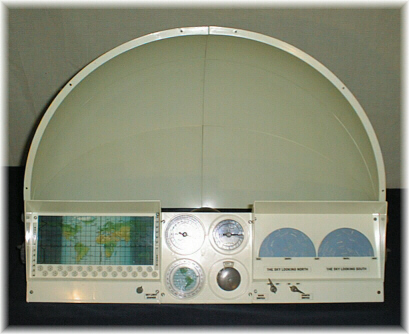
| A truly amazing home planetarium
toy was introduced in 1963 by the Renwal Model Company of Miniola,
NY. Renwal was well known for realistic and scientifically accurate
model kits and the Cosmorama was no exemption. This planetarium is
loaded with features! By using the control panel the user can dial
in the current date and time of day and see the appropriate stars projected
into the unit's half dome, which measures about two feet in diameter.
Stars are projected down to a Magnitude of 3.5 via a small three inch star
ball. Two rotating star charts (one for the Northern Hemisphere and
another for the Southern Hemisphere) are synchronized to the star ball's
movements. When the unit's hand crank is turned, the stars rotate
in the half dome, mimicking the real motion of the night's sky. The
charts follow along to keep you updated on what part of the sky you are
looking at. There is another hand crank to provide latitude adjustment
which is also accompanied by a latitude readout display. This shows
your current position on the earth. Other
features include an indicator for local time and a adjustable sunrise/sunset
control. There is even a dial control that calculates the equation
of time, it gives a readout of day and night and their changes from season
to season! If that isn't enough, the Cosmorama can also make very realistic
cloud effects that work in both the day and night modes. One of the
most convincing effects is of a partly cloudy evening, the stars
seem to poke in and out of the clouds. The Cosmorama can produce
many effects that a real planetarium can, and it sold for only $19.95.
The toys' only short coming was that you have to be a "mechanical engineer"
to put it together. With its many gears and subassemblies it was
very difficult to assemble. This was definitely a kit for the advanced
model maker!
Cosmorama also came with a twenty page illustrated book about astronomy, making it a true learning experience. This planetarium toy is a real collector's item. The sheer complexity of the planetarium and the fact that it was completely made from plastic didn't give it a long life expectancy. Because of this there are very few surviving units. I was fortunate to find one through a Sky and Telescope advertisement. I would rate this toy very rare. |
